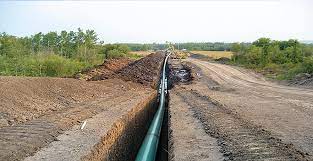FACTS ABOUT BURIED PIPELINES IN THE UK
Buried underneath the UK run a network of pipelines safely and efficiently carrying a range of products (including fuel, gas and chemicals) to strategic points across the country.
BPA is responsible for managing more than 2000km of buried pipelines that carry fuel at high pressure from ports and refineries to storage and distribution points across the UK. Here we outline some fun facts about the UK’s buried pipeline network:
Did you know..?
- The United Kingdom Pipeline Operators’ Association (UKOPA) manage more than 27,000 km of pipelines in the UK (nearly 5 times the distance between London and New York). Of that pipeline, more than 14,000km are buried oil and gas pipelines. The pipelines run under agricultural land as well as through towns and cities.
- The pipelines are actually shallower than many people realise and are often at a nominal dept of only 3 feet. In places they can be even shallower and are sometimes visible when crossing canals and rivers.
- Damaging a pipeline can be very expensive – it is estimated that a damaged pipeline can cost around £15m to repair, this cost can escalate dramatically if there is a loss of product into the environment or the damage leads to explosion or a serious incident / injury.
- Pipelines are protected by The Pipelines Safety Regulations 1996 which makes it illegal to cause any damage to the pipeline intentionally or unintentionally. Working within 3 meters either side of the pipeline, without contacting the pipeline operator is generally illegal, so even if you have some knowledge about the pipeline it is always best to contact the operator if planning works.
- The original pipelines were installed during the second world war to safely deliver fuel to British and US airbases around the country.
- High-pressure oil and gas pipelines are laid in welded steel sections and carry products at high pressure – up to 50 times that of a car tyre.
- Transporting product by pipeline greatly reduces the amount of tankers on the road and helps efficiently meet the UK’s fuel needs.
- For anyone working within the vicinity of a pipeline, typically 50 metres, it’s essential that the pipeline operator knows about your presence. This means contacting the pipeline operators if you are installing drains or pipes, deepening ditches, putting up fences, or doing any other construction or excavation work.
- The route of the pipelines is constantly checked, both on foot and from the air. Any infringements or unauthorised works will be detected.
- The pipelines are indicated by a series of marker posts at key locations, however pipelines do not always travel in straight lines between marker posts so it is always best to contact the pipelines operator if you have any questions.
If you have any questions about the location of a pipeline on your land or if you would like to contact a member of BPA’s team to discuss undertaking some works near to the buried pipelines, contact a member of BPA’s Lands Team on 0800 585 387.



